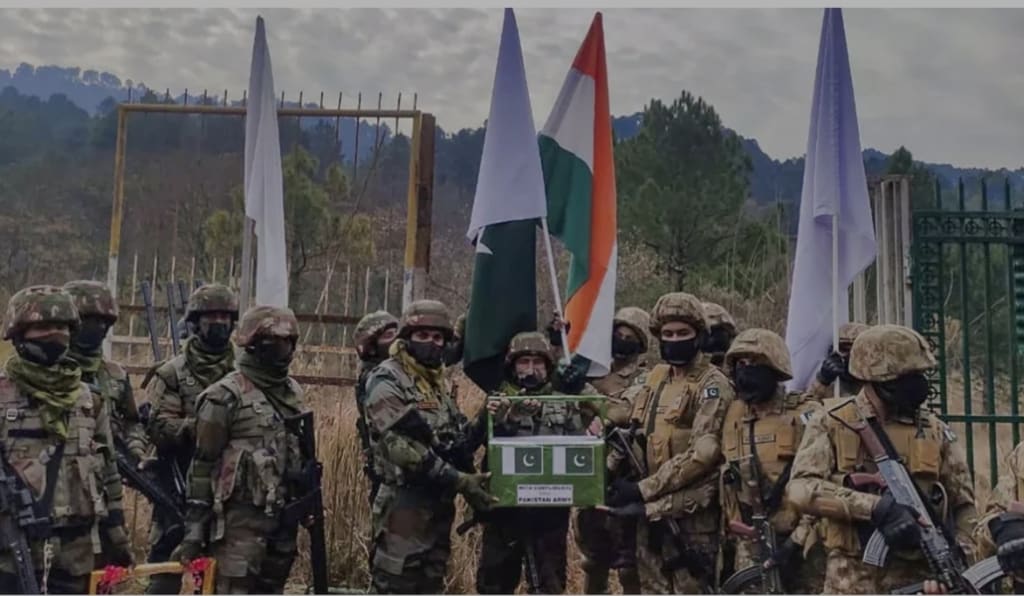India and Pakistan agree to ceasefire along the Line of Control:
"India and Pakistan reach a historic ceasefire agreement after months of diplomatic efforts"

On February 25, 2021, India and Pakistan announced a ceasefire agreement along the Line of Control (LoC) in Jammu and Kashmir, marking a significant development in the bilateral relationship between the two countries.
The announcement came in the form of a joint statement issued by the military operations directorates of India and Pakistan. The statement read, "Both sides agreed for strict observance of all agreements, understandings and cease firing along the Line of Control and all other sectors with effect from midnight of 24/25 Feb 2021."
The ceasefire agreement is expected to bring relief to the civilians living in the border areas, who have been facing frequent cross-border firing and shelling. The announcement of the ceasefire was welcomed by many people on both sides of the border, who have been advocating for peace between the two countries.
The agreement comes after months of behind-the-scenes diplomacy between the two countries, which were facilitated by the United Arab Emirates. The UAE played a key role in bringing the two sides to the negotiating table and in facilitating the ceasefire agreement.
The move is significant because it signals a possible shift in the tense relationship between India and Pakistan, which have been engaged in a long-standing dispute over the region of Kashmir. The ceasefire agreement could pave the way for further talks and negotiations between the two countries, aimed at resolving the Kashmir dispute and other outstanding issues.
The conflict over Kashmir dates back to the 1947 partition of India and Pakistan, which led to the creation of two separate countries. Both India and Pakistan claim the region of Kashmir as their own, and the dispute has led to multiple wars and frequent cross-border clashes.
The announcement of the ceasefire comes after a particularly tense period in the region, marked by a sharp increase in cross-border firing and shelling in recent months. In 2020, there were more than 5,000 ceasefire violations along the LoC, resulting in the deaths of several civilians and soldiers on both sides.
The ceasefire agreement has been welcomed by the international community, with many countries expressing hope that it will lead to a reduction in tensions between India and Pakistan. The United Nations Secretary-General, Antonio Guterres, welcomed the announcement of the ceasefire, stating that he hoped it would "provide an opportunity for further dialogue."
The move has also been praised by many experts, who see it as a positive step towards resolving the long-standing conflict over Kashmir. "The ceasefire is a significant confidence-building measure," said Ashok K. Mehta, a former Indian army general and defense analyst. "It will bring relief to the people living on the border, who have been bearing the brunt of the conflict for decades."
However, some experts caution that the ceasefire agreement is only the first step towards resolving the conflict, and that much more needs to be done to address the underlying issues. "The ceasefire is a good start, but it's not enough," said Michael Kugelman, a South Asia expert at the Wilson Center in Washington, D.C. "There needs to be a sustained effort to engage in talks and negotiations to resolve the underlying issues that have led to the conflict."
The announcement of the ceasefire has been widely covered by the media in India and Pakistan, with many people expressing hope for peace and stability in the region. Social media platforms have been flooded with messages of support for the ceasefire, with many people sharing photos and videos of celebrations in the border areas.
In conclusion, the ceasefire agreement between India and Pakistan marks a significant development in the bilateral relationship between the two countries. The move is expected to bring relief to the civilians living in the border areas and could pave the way for further talks and negotiations aimed at resolving the long-standing conflict over Kashmir. However, much more needs to be done to address the underlying issues and to ensure a lasting peace in the region.





Comments
There are no comments for this story
Be the first to respond and start the conversation.